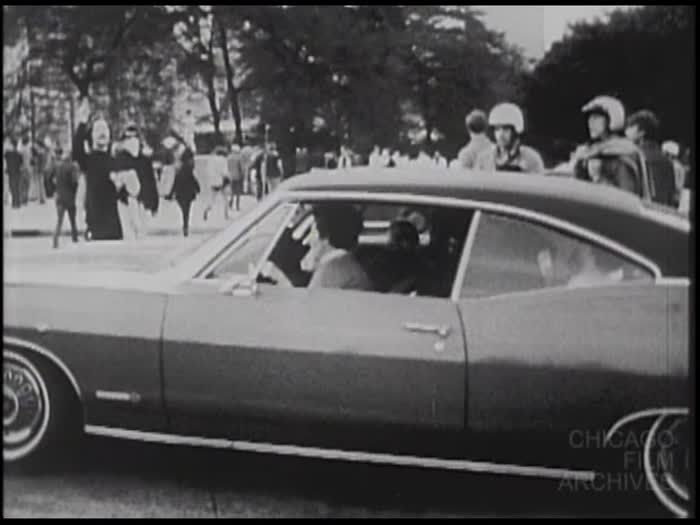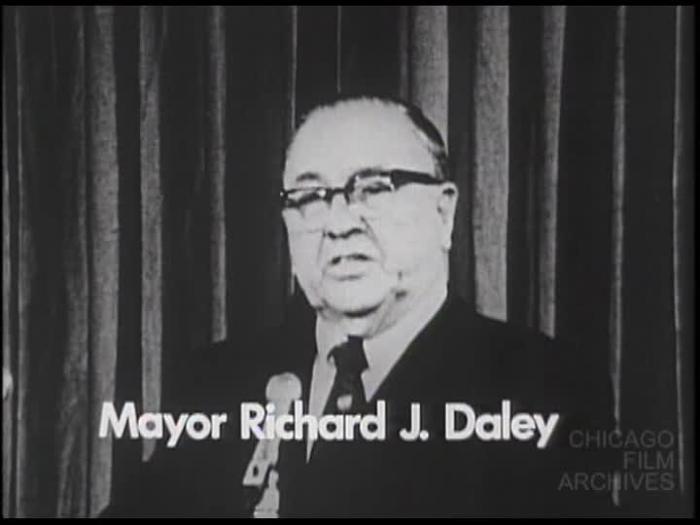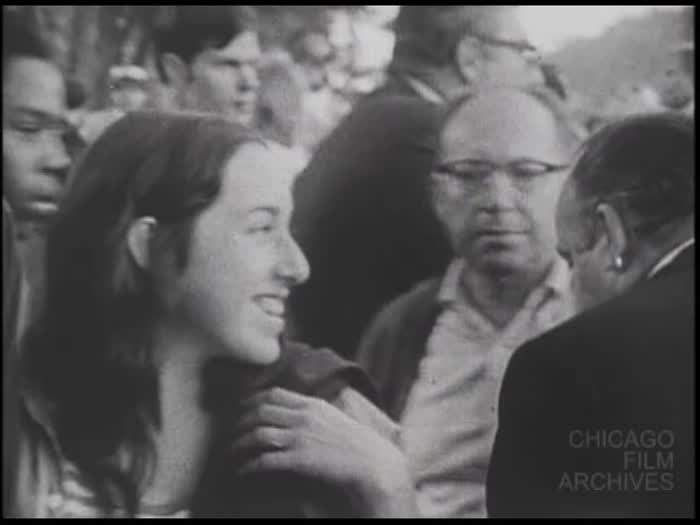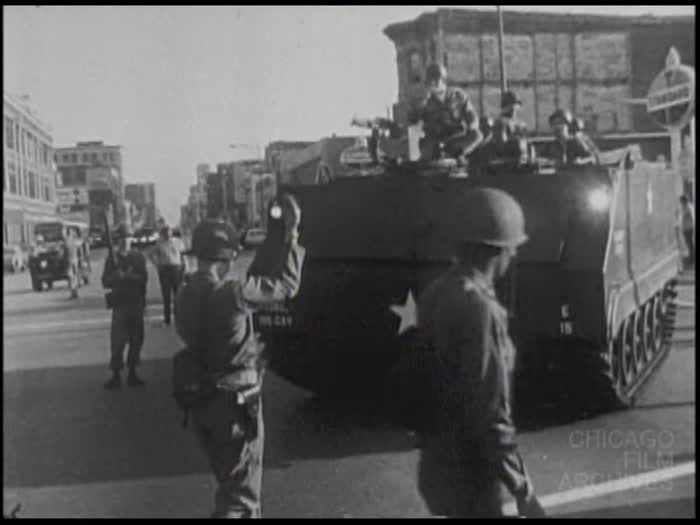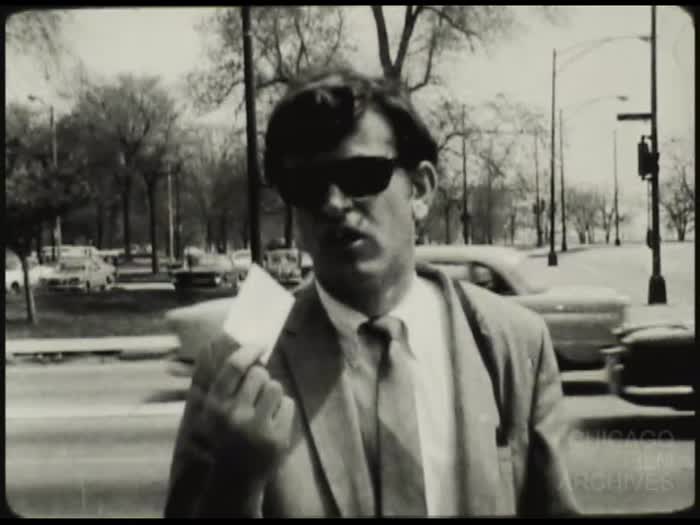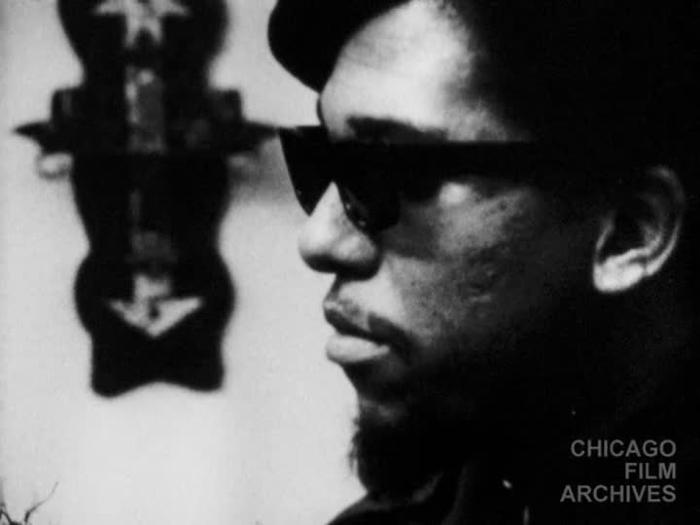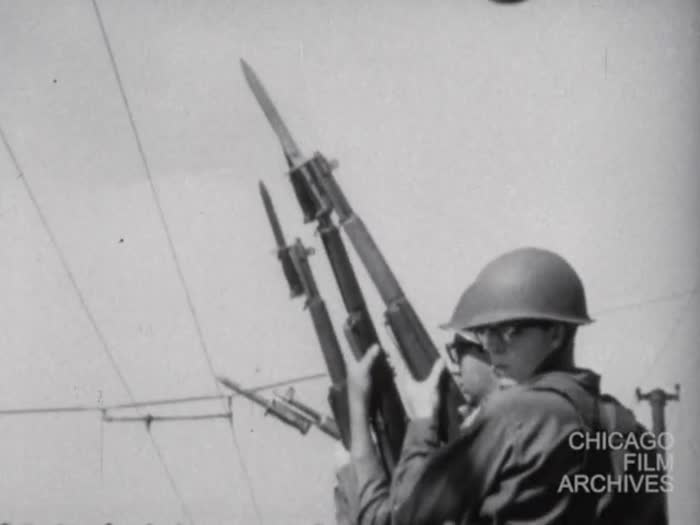SERIES: Urban Crisis and the New Militants
Abstract
A seven part series of educational short films produced by the Film Group that, “teach by raising questions rather than by attempting to answer them.” The modules tell their story through editing rather than voice-over narration and show “real events, with real people acting spontaneously,” as the Film Group explained to an educational film distributor. Five of the seven films in the "Urban Crisis and the New Militants" series utilize footage from the 1968 Chicago Democratic Convention, while the other two (Cicero March and Black Moderates, Black Militants) are concerned with similar issues of civil rights and civil disobedience, but were not filmed during the Democratic Convention.
Inclusive Dates
1966 – 1969
Series identifier
S.2005-03-0002
Description
The Film Group created the Urban Crisis series as educational films aimed at high school students. The films and accompanying literature used current political events as springboards into discussions on the limits of constitutional freedoms and the proper response of the government. Though made for the educational film market, they are closer in style to cinema verite documentary films. They dispense with the didactic Voice-over narrator and are shot in black and white.
These seven short films in the Urban Crisis series have been preserved through grants from the National Film Preservation Foundation. Chicago Film Archives has original release prints and answer prints as well as new preservation elements including internegatives, sound elements, and access prints for projection. In 2013, Cicero March (1966) was added to the National Film Registry.
The seven films in the Urban Crisis series are:
• Black Moderates and Black Militants (1969) documents a meeting between Chicago Black Panther members, including future Congressman Bobby Rush, and an African American school principal.
• Cicero March (1966) follows a 1966 march in Cicero, IL led by Robert Lucas, Chairman of the Chicago branch of the Congress of Racial Equality, and an associate of Martin Luther King, Jr., demanding the end of discriminatory employment practices engaged in by some of Cicero’s principal employers. White inhabitants of Cicero hurl insults at the African American demonstrators as police officers attempt to tamp down on threats of violence.
• Law and Order vs. Dissent (1968) intermixes footage of the police response to the demonstrations at the 1968 Convention with press conferences by Mayor Richard J. Daley and a spokesman for the Chicago Police Department.
• The People’s Right to Know: Police vs. Reporters (1968) interviews photojournalist Paul Sequeira on his experience covering the 1968 Democratic Convention and the police attempts to physically restrict reporters’ access.
• Police Power and Freedom of Assembly: The Gregory March (1968) depicts a rally led by comedian and political activist Dick Gregory at the 1968 Chicago Democratic Convention. This footage is included in American Revolution II.
• The Right to Dissent: A Press Conference (1968) records a pre-convention press conference of the National Committee to End in the War in Vietnam. David Dellinger and Rennie Davis recount their difficulties in dealing with the City of Chicago to plan their protests against the 1968 Democratic Convention.
• Social Confrontation: The Battle of Michigan Ave. (1968) shows one day’s events at the 1968 Democratic Convention including National Guardsmen detaining protestors, mass arrests near Grant Park, and Mayor Daley cursing at opponents from the convention floor.
These seven short films in the Urban Crisis series have been preserved through grants from the National Film Preservation Foundation. Chicago Film Archives has original release prints and answer prints as well as new preservation elements including internegatives, sound elements, and access prints for projection. In 2013, Cicero March (1966) was added to the National Film Registry.
The seven films in the Urban Crisis series are:
• Black Moderates and Black Militants (1969) documents a meeting between Chicago Black Panther members, including future Congressman Bobby Rush, and an African American school principal.
• Cicero March (1966) follows a 1966 march in Cicero, IL led by Robert Lucas, Chairman of the Chicago branch of the Congress of Racial Equality, and an associate of Martin Luther King, Jr., demanding the end of discriminatory employment practices engaged in by some of Cicero’s principal employers. White inhabitants of Cicero hurl insults at the African American demonstrators as police officers attempt to tamp down on threats of violence.
• Law and Order vs. Dissent (1968) intermixes footage of the police response to the demonstrations at the 1968 Convention with press conferences by Mayor Richard J. Daley and a spokesman for the Chicago Police Department.
• The People’s Right to Know: Police vs. Reporters (1968) interviews photojournalist Paul Sequeira on his experience covering the 1968 Democratic Convention and the police attempts to physically restrict reporters’ access.
• Police Power and Freedom of Assembly: The Gregory March (1968) depicts a rally led by comedian and political activist Dick Gregory at the 1968 Chicago Democratic Convention. This footage is included in American Revolution II.
• The Right to Dissent: A Press Conference (1968) records a pre-convention press conference of the National Committee to End in the War in Vietnam. David Dellinger and Rennie Davis recount their difficulties in dealing with the City of Chicago to plan their protests against the 1968 Democratic Convention.
• Social Confrontation: The Battle of Michigan Ave. (1968) shows one day’s events at the 1968 Democratic Convention including National Guardsmen detaining protestors, mass arrests near Grant Park, and Mayor Daley cursing at opponents from the convention floor.
Series Items
Film
Social Confrontation: The Battle of Michigan Ave.
1968
Film
Law and Order vs. Dissent
1968
Film
Police Power and Freedom of Assembly: The Gregory March
1968
Film
Right to Dissent: A Press Conference, The
1968
Film
People’s Right to Know: Police vs. Reporters, The
1969
Film
Black Moderates and Black Militants
1969
Film
Cicero March
1966
To request more information about the items in this collection, please contact the archive at
info@chicagofilmarchives.org.
Items with Viewable Media
-
SERIES: Urban Crisis and the New Militants
- Black Moderates and Black Militants
- Cicero March
- Law and Order vs. Dissent
- People’s Right to Know: Police vs. Reporters, The
- Police Power and Freedom of Assembly: The Gregory March
- Right to Dissent: A Press Conference, The
- Social Confrontation: The Battle of Michigan Ave.



